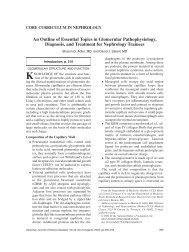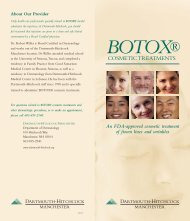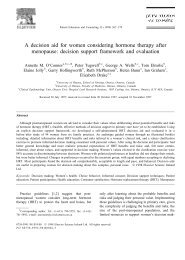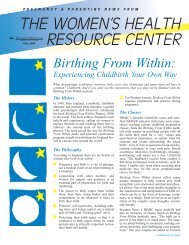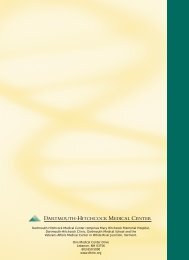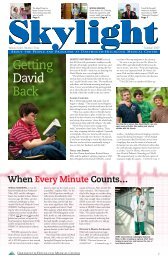Surgery and Healing in the Developing World - Dartmouth-Hitchcock
Surgery and Healing in the Developing World - Dartmouth-Hitchcock
Surgery and Healing in the Developing World - Dartmouth-Hitchcock
Create successful ePaper yourself
Turn your PDF publications into a flip-book with our unique Google optimized e-Paper software.
International Surgical Education<br />
oped world unless <strong>the</strong>re is an encroach<strong>in</strong>g threat—such as an epidemic—or unless<br />
fear or fasc<strong>in</strong>ation arouse curiosity about our neighbors.<br />
To better underst<strong>and</strong> <strong>the</strong> problems faced globally <strong>and</strong> <strong>the</strong> educational resources<br />
adapted to meet <strong>the</strong>se challenges <strong>in</strong> several different systems, surgical educators from<br />
several cont<strong>in</strong>ents were assembled <strong>and</strong> addressed <strong>the</strong> issues of <strong>in</strong>ternational surgical<br />
education <strong>in</strong> order to respond to ris<strong>in</strong>g dem<strong>and</strong>s <strong>in</strong> quantity <strong>and</strong> quality of surgical<br />
services <strong>in</strong> an era of perceived resource restrictions.<br />
Africa<br />
Nigeria has <strong>the</strong> largest population <strong>in</strong> black Africa with as much as one-fifth of<br />
<strong>the</strong> cont<strong>in</strong>ent’s people. For a population of over 100 million people, located mostly<br />
<strong>in</strong> <strong>the</strong> rural countryside, <strong>the</strong>re are fewer than 10,000 medical doctors, most of whom<br />
live <strong>and</strong> practice <strong>in</strong> large cities. Before 1948, most Nigerian doctors were tra<strong>in</strong>ed <strong>in</strong><br />
Europe <strong>and</strong> North America. Today <strong>the</strong>re are 13 medical schools throughout Nigeria,<br />
n<strong>in</strong>e of <strong>the</strong>m <strong>in</strong> <strong>the</strong> nation’s sou<strong>the</strong>rn sections.<br />
To improve <strong>the</strong> health of <strong>the</strong> Nigerian population, <strong>the</strong> medical schools have<br />
planned curricula to respond to <strong>the</strong> health care problems of that nation, even though<br />
<strong>the</strong> medical schools <strong>the</strong>mselves were patterned after educational systems orig<strong>in</strong>at<strong>in</strong>g<br />
<strong>in</strong> quite different environments.<br />
Admission to a medical school is through jo<strong>in</strong>-matriculation exam<strong>in</strong>ation; classes<br />
of 50 students <strong>in</strong> <strong>the</strong> newer medical schools <strong>and</strong> over 200 <strong>in</strong> <strong>the</strong> longer established<br />
schools are common. These students spend two years <strong>in</strong> basic science <strong>and</strong> three years<br />
<strong>in</strong> cl<strong>in</strong>ical rotations. Although <strong>the</strong> government is exert<strong>in</strong>g a lot of pressure to <strong>in</strong>crease<br />
<strong>the</strong> <strong>in</strong>take of students, <strong>the</strong> limit<strong>in</strong>g factor has been <strong>the</strong> <strong>in</strong>frastructure of facilities<br />
to accommodate <strong>the</strong> students. <strong>Surgery</strong> plays an important role <strong>in</strong> <strong>the</strong> education<br />
of all undergraduate medical students, s<strong>in</strong>ce at <strong>the</strong> end of tra<strong>in</strong><strong>in</strong>g <strong>the</strong>y must be able<br />
to apply <strong>the</strong> surgical skills dem<strong>and</strong>ed of a general duty medical officer <strong>in</strong> a develop<strong>in</strong>g<br />
tropical country. Exposure to surgical illnesses <strong>and</strong> <strong>the</strong> development of fundamental<br />
surgical skills take place <strong>in</strong> general surgery <strong>and</strong> specialty rotations at different<br />
times <strong>in</strong> <strong>the</strong> curriculum for a total up to n<strong>in</strong>e months of <strong>the</strong> medical school experience.<br />
The undergraduate exam<strong>in</strong>ation <strong>in</strong> surgery was modeled on <strong>the</strong> British system<br />
until more recently, when experiments <strong>in</strong> objective grad<strong>in</strong>g of multiple choice questions<br />
<strong>and</strong> cl<strong>in</strong>ical papers were begun. There currently is a very strong emphasis on a<br />
well-structured cl<strong>in</strong>ical exam<strong>in</strong>ation. Because of a grow<strong>in</strong>g public concern about <strong>the</strong><br />
length of <strong>the</strong> tra<strong>in</strong><strong>in</strong>g program <strong>and</strong> <strong>the</strong> perceived need to produce more doctors at a<br />
reduced commitment <strong>in</strong> time, <strong>the</strong>re is pressure to de-emphasize of basic medical<br />
science subjects. This public pressure for a devaluation of quality surgical education<br />
<strong>in</strong> exchange for immediate <strong>in</strong>crease <strong>in</strong> physicians is an especially vex<strong>in</strong>g problem <strong>in</strong><br />
Africa. The urgency of public dem<strong>and</strong> may be depreciat<strong>in</strong>g medical expertise <strong>in</strong><br />
parts of <strong>the</strong> developed world as well. A story is told about Charles Elliot, <strong>the</strong> famed<br />
educator <strong>and</strong> past president of Harvard University (1869-1909), who was asked<br />
why Harvard had ga<strong>in</strong>ed a reputation as <strong>the</strong> greatest storehouse of knowledge <strong>in</strong> <strong>the</strong><br />
country. He replied, “In all likelihood, it is because <strong>the</strong> freshmen br<strong>in</strong>g to us so<br />
much knowledge while <strong>the</strong> seniors take away so little of it.”<br />
South America<br />
Disease patterns vary around <strong>the</strong> world accord<strong>in</strong>g to geographic conditions, ethnic<br />
patterns, <strong>and</strong> socioeconomic development. Colombia is experienc<strong>in</strong>g an <strong>in</strong>crease<br />
19<br />
4



